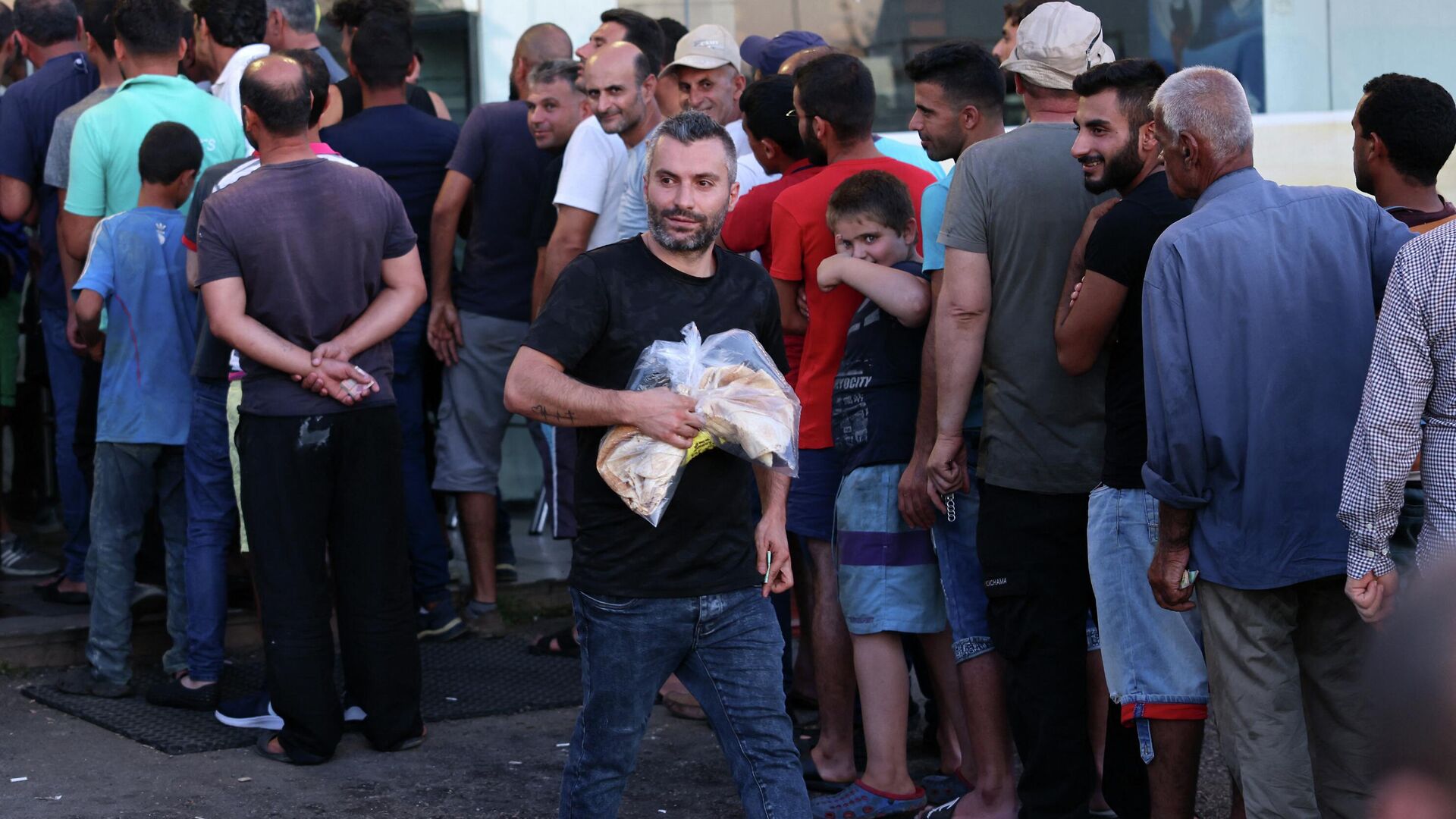https://sputnikglobe.com/20220728/protesters-reportedly-storm-energy-ministry-premise-in-beirut-clash-with-staff-1097892372.html
Protesters Reportedly Storm Energy Ministry Premise in Beirut, Clash With Staff
Protesters Reportedly Storm Energy Ministry Premise in Beirut, Clash With Staff
Sputnik International
BEIRUT (Sputnik) - Protesters who gathered outside the Lebanese energy ministry in Beirut have stormed inside the building and engaged in brawl with employees... 28.07.2022, Sputnik International
2022-07-28T14:08+0000
2022-07-28T14:08+0000
2022-07-28T14:08+0000
lebanon
beirut
energy
protest
bread
https://cdn1.img.sputnikglobe.com/img/07e6/07/1c/1097892523_0:190:2965:1858_1920x0_80_0_0_5778a59687c60b26ce38d591833bd603.jpg
Lebanon has been experiencing an energy crisis for several years now. Occasionally electricity in populated settlements is absent for several days in a row, with most Lebanese unable to afford private power generators.Security officers intervened in a scuffle inside the building of the energy ministry, which broke out between protesters and the ministry staff, to prevent the conflict from escalating. They escorted the protesters out of the administrative building, with the situation at the energy ministry stabilized and protesters dispersed, according to Murr Television.Commenting on the incident, one of the activists told the broadcaster that the protesters had no complaints against the Lebanese police and army. The demonstration was organized to hold officials accountable and force them to take action.At the same time, in different regions of Lebanon, including in the capital of Beirut, people are gathering in queues to buy bread amid a major shortage of traditional Arab flatbread, a Sputnik correspondent reported."This situation has been going on for more than 10 days. The flatbreads are delivered, but in very limited quantities. They are sold out almost immediately after opening," an employee of one of Beirut's major bakery chains said.Meanwhile, bakeries still offer other bread products that are not subsidized by the government and are considered expensive for the average citizen, with subsidized traditional Arab bread becoming more expensive. The shortages have prompted the emergence of a "black market," where bread can be bought at double or triple price.Lebanon has suffered a deep financial and economic crisis, accompanied by political and social tensions, for over two years. Against the background of the crisis, the banking system has completely collapsed, and the national currency has depreciated more than 20 times against the US dollar. As a result, over 70% of the population were left below the poverty line.
lebanon
beirut
Sputnik International
feedback@sputniknews.com
+74956456601
MIA „Rosiya Segodnya“
2022
Sputnik International
feedback@sputniknews.com
+74956456601
MIA „Rosiya Segodnya“
News
en_EN
Sputnik International
feedback@sputniknews.com
+74956456601
MIA „Rosiya Segodnya“
Sputnik International
feedback@sputniknews.com
+74956456601
MIA „Rosiya Segodnya“
lebanon, beirut, energy, protest, bread
lebanon, beirut, energy, protest, bread
Protesters Reportedly Storm Energy Ministry Premise in Beirut, Clash With Staff
BEIRUT (Sputnik) - Protesters who gathered outside the Lebanese energy ministry in Beirut have stormed inside the building and engaged in brawl with employees, the Lebanese media reported on Thursday.
Lebanon has been experiencing an energy crisis for several years now. Occasionally electricity in populated settlements is absent for several days in a row, with most Lebanese unable to afford private power generators.
Security officers intervened in a scuffle inside the building of the energy ministry, which broke out between protesters and the ministry staff, to prevent the conflict from escalating. They escorted the protesters out of the administrative building, with the situation at the energy ministry stabilized and protesters dispersed, according to Murr Television.
Commenting on the incident, one of the activists told the broadcaster that the protesters had no complaints against the Lebanese police and army. The demonstration was organized to hold officials accountable and force them to take action.
At the same time, in different regions of Lebanon, including in the capital of Beirut, people are gathering in queues to buy bread amid a major shortage of traditional Arab flatbread, a Sputnik correspondent reported.
"This situation has been going on for more than 10 days. The flatbreads are delivered, but in very limited quantities. They are sold out almost immediately after opening," an employee of one of Beirut's major bakery chains said.
Meanwhile, bakeries still offer other bread products that are not subsidized by the government and are considered expensive for the average citizen, with subsidized traditional Arab bread becoming more expensive. The shortages have prompted the emergence of a "black market," where bread can be bought at double or triple price.
Lebanon has suffered a deep financial and economic crisis, accompanied by political and social tensions, for over two years. Against the background of the crisis, the banking system has completely collapsed, and the national currency has depreciated more than 20 times against the US dollar. As a result, over 70% of the population were left below the poverty line.



